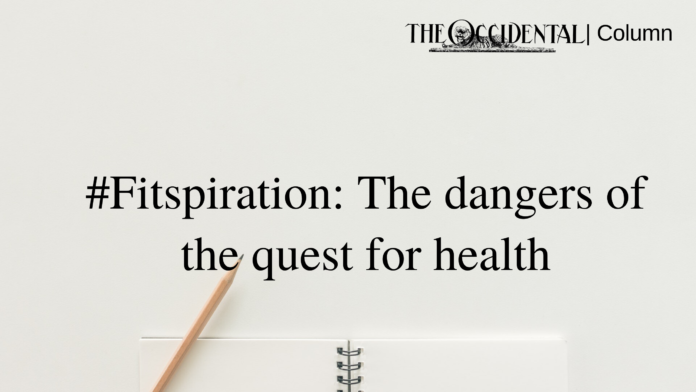It began with exercise — when I was a kid, I would push myself and my body during workouts. I began to devote more and more of my day to finding the perfect workout set, the perfect form and the “healthiest” meals. I was on the quest for “health.”
The quest for perfect health took up hours of my day, and eventually, my entire adolescence. In my free time, I’d browse workouts and meal ideas. Throughout high school, my friends affectionately called me “Broccoli Girl.” “Vegan” remained in my social media usernames for years. I eventually found out that I had developed anorexia nervosa, exercise addiction and orthorexia — an eating disorder characterized by an obsession with healthy eating and fear around eating anything other than what I felt was safe. I was lucky enough to spend several years in treatment, and I’ve reclaimed my thoughts, time and life from the all-consuming obsession for perfect health (or, perhaps more accurately, the “perfect body”). What I didn’t realize back then, though, was that health is a lot more than what meets the eye — and often, it can’t be captured in a picture at all.
Health is much more complicated than Instagram fitness gurus, diet culture or fitspiration portray it to be. Health, by its dictionary definition, means the absence of illness or injury. It makes no mention of morality, discipline, control or appearance. But diet culture and fitspiration on Instagram give the idea of health a lot more weight than they should. They associate a constant pursuit of health with “discipline” and “control,” despite the fact that prioritizing rest may be a better measure of true control. Diet culture says that we should all constantly be on a quest for health — and that that quest is a moral issue, indicative of a person’s qualities. But often, “health” and well-being content online is just a facade for weight loss and thinness.
Fitspiration content on social media “aims to inspire individuals to exercise and be healthy.” The #fitspiration hashtag reveals photos of thin people working out, along with (ostensibly) inspirational slogans such as “eating well is a form of self-respect” and “be stronger than your excuse.” Fitspiration content frequently tells you how to eat less, with “before and after” images highlighting changes in weight or muscle. These photos and taglines underscore several beliefs: that your health is linked to reducing your body size, that you can see health on a surface level and that your body should be linked to self-worth and discipline. They don’t beget self-compassion or a more holistic, less objectifying view of the self, which we all deserve to have.
Fitspiration clearly contains a lot of rules about what it means to take up space — and the rules don’t work for everyone. For some, health looks like body rolls and curves, and for others, it looks like the fitspiration content online. In this way, fitspiration makes it easy to compare yourself to others — and see yourself as lesser than if you don’t look the way they do. Comparing your own body to this content “leads to a distortion of body image” and disordered eating, which can quickly become dangerous.
Often, people get validation from fitspiration content, too. If they think they “look fit,” they feel more comfortable in their own body. That validation is understandable; everyone wants to feel confident. I know that’s been the hardest thing for me about escaping the insidious Fitspiration aspiration: I remember how it once made me feel good. But it’s very easy to fall into a dangerous cycle of needing body validation to feel okay when you base your ability to “be okay” only on what you look like. It is particularly dangerous considering that Fitspiration’s beauty standards are unreachable — they say that you need to keep “perfecting” your body forever. Chasing unreachable perfection can make you lose hours, days and years, and that’s time that you deserve to spend experiencing life.
The message I urgently want to convey is that your body doesn’t represent who you are, nor does it represent your health. A chiseled body does not mean you are “good” and a body with more softness does not mean you are “bad.”
Health shouldn’t be associated with morality, self-esteem or appearance. You deserve more than to have your self-worth be bound up in what you look like. A quest for perfect fitness or “clean eating” may be never-ending, and you deserve to exist without obsession or comparison.
Next time you feel like you need to look a certain way to be beautiful or “in control,” remind yourself that you are more than your body and it doesn’t define who you are.
Separating your body from self-worth is a difficult journey, and support can be found here for those who need it.
The author for this piece is Sophie Kaviar, a member of a chapter of the organization at Occidental College. Active Minds is a national organization that aims to reduce the stigma surrounding illness and promote good mental health.
![]()































